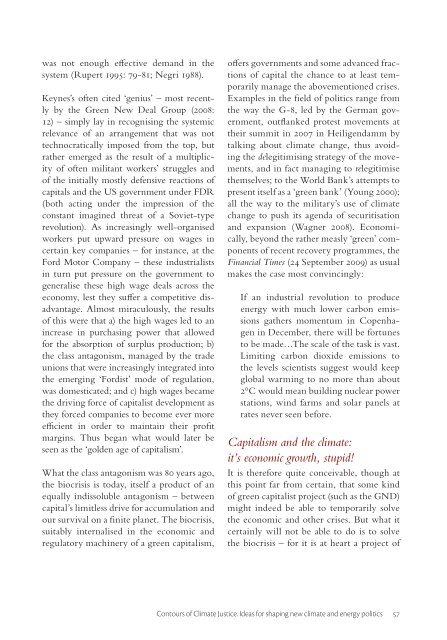Contours of Climate Justice - Dag Hammarskjöld Foundation
Contours of Climate Justice - Dag Hammarskjöld Foundation
Contours of Climate Justice - Dag Hammarskjöld Foundation
Create successful ePaper yourself
Turn your PDF publications into a flip-book with our unique Google optimized e-Paper software.
was not enough eff ective demand in the<br />
system (Rupert 1995: 79-81; Negri 1988).<br />
Keynes’s <strong>of</strong>ten cited ‘genius’ – most recently<br />
by the Green New Deal Group (2008:<br />
12) – simply lay in recognising the systemic<br />
relevance <strong>of</strong> an arrangement that was not<br />
technocratically imposed from the top, but<br />
rather emerged as the result <strong>of</strong> a multiplicity<br />
<strong>of</strong> <strong>of</strong>ten militant workers’ struggles and<br />
<strong>of</strong> the initially mostly defensive reactions <strong>of</strong><br />
capitals and the US government under FDR<br />
(both acting under the impression <strong>of</strong> the<br />
constant imagined threat <strong>of</strong> a Soviet-type<br />
revolution). As increasingly well-organised<br />
workers put upward pressure on wages in<br />
certain key companies – for instance, at the<br />
Ford Motor Company – these industrialists<br />
in turn put pressure on the government to<br />
generalise these high wage deals across the<br />
economy, lest they suff er a competitive disadvantage.<br />
Almost miraculously, the results<br />
<strong>of</strong> this were that a) the high wages led to an<br />
increase in purchasing power that allowed<br />
for the absorption <strong>of</strong> surplus production; b)<br />
the class antagonism, managed by the trade<br />
unions that were increasingly integrated into<br />
the emerging ‘Fordist’ mode <strong>of</strong> regulation,<br />
was domesticated; and c) high wages became<br />
the driving force <strong>of</strong> capitalist development as<br />
they forced companies to become ever more<br />
effi cient in order to maintain their pr<strong>of</strong>i t<br />
margins. Thus began what would later be<br />
seen as the ‘golden age <strong>of</strong> capitalism’.<br />
What the class antagonism was 80 years ago,<br />
the biocrisis is today, itself a product <strong>of</strong> an<br />
equally indissoluble antagonism – between<br />
capital’s limitless drive for accumulation and<br />
our survival on a fi nite planet. The biocrisis,<br />
suitably internalised in the economic and<br />
regulatory machinery <strong>of</strong> a green capitalism,<br />
<strong>of</strong>f ers governments and some advanced fractions<br />
<strong>of</strong> capital the chance to at least temporarily<br />
manage the abovementioned crises.<br />
Examples in the fi eld <strong>of</strong> politics range from<br />
the way the G-8, led by the German government,<br />
outfl anked protest movements at<br />
their summit in 2007 in Heiligendamm by<br />
talking about climate change, thus avoiding<br />
the delegitimising strategy <strong>of</strong> the movements,<br />
and in fact managing to relegitimise<br />
themselves; to the World Bank’s attempts to<br />
present itself as a ‘green bank’ (Young 2000);<br />
all the way to the military’s use <strong>of</strong> climate<br />
change to push its agenda <strong>of</strong> securitisation<br />
and expansion (Wagner 2008). Economically,<br />
beyond the rather measly ‘green’ components<br />
<strong>of</strong> recent recovery programmes, the<br />
Financial Times (24 September 2009) as usual<br />
makes the case most convincingly:<br />
If an industrial revolution to produce<br />
energy with much lower carbon emissions<br />
gathers momentum in Copenhagen<br />
in December, there will be fortunes<br />
to be made…The scale <strong>of</strong> the task is vast.<br />
Limiting carbon dioxide emissions to<br />
the levels scientists suggest would keep<br />
global warming to no more than about<br />
2°C would mean building nuclear power<br />
stations, wind farms and solar panels at<br />
rates never seen before.<br />
Capitalism and the climate:<br />
it’s economic growth, stupid!<br />
It is therefore quite conceivable, though at<br />
this point far from certain, that some kind<br />
<strong>of</strong> green capitalist project (such as the GND)<br />
might indeed be able to temporarily solve<br />
the economic and other crises. But what it<br />
certainly will not be able to do is to solve<br />
the biocrisis – for it is at heart a project <strong>of</strong><br />
<strong>Contours</strong> <strong>of</strong> <strong>Climate</strong> <strong>Justice</strong>. Ideas for shaping new climate and energy politics 57
















